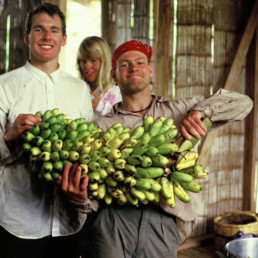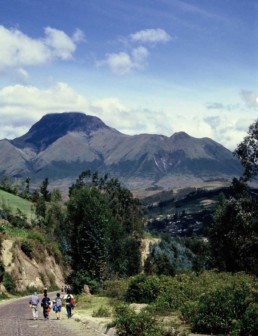In the spring of 1985 I was a freshman at the University of Washington. I’d grown up in the small town of Enumclaw, in the foothills of the Cascade Mountains, and the transition to the Greek system at UW – Yes, I was a frat guy – was difficult. Surrounded by so many well-to-do, attractive people made me feel ugly, and I learned quickly that studiousness and a weird sense of humor were not valued social skills in that world.
So when I came back to my room after a mid-term that sunny spring day, I was in the market for a bit of change. Luckily for me, I found a tri-fold brochure, poorly printed on cheap paper, advertising South America wilderness expeditions for college credit. I read the brochure, filled out the application form, and wrote a $100 deposit check.
Then I called the restaurant where I worked to see if I could pick up some extra shifts to cover the check.
I worked three jobs that summer (all of them shitty) to pay for the trip, and in early January of 1986 I landed in Quito Ecuador to begin a six week journey that set my life on an entirely new course. We started with a couple weeks camping in Cotopaxi National Park, and then made our way to Agua Rico River on the Peruvian border, where we lived with the Cofan tribe. We spent our time in the jungle hunting wild boar with bamboo spears, and generally making a nuisance of ourselves in our efforts to embrace the whole experience. The trip ended with a week living in tents on the Caribbean coast of Costa Rica, in Cahuita National Park.

The picture of me holding the bananas was taken in the Cofan village, after my buddy Dave Crowe and I purchased that giant mass of snack food for fifteen cents. The woman in the background was one of 17 women who made up the majority of the group. I was one of only seven guys on the trip. Those ratios would have been far better for me if I hadn’t had suffered food poisoning for the majority of our time together.
Despite my illnesses, it was truly the trip of a lifetime. We hiked in the Andes, we haggled with vendors in mountain markets and picked cockroaches out of our granola every morning before eating the stuff. We paddled dugout canoes down Amazon tributaries while jaguars coughed in the jungle nearby. We also experienced the disconnect between our pampered suburban lives and the challenges faced by the vast majority of the people in this world. Is that a new thought? Hell no. It’s a cliché. But although I’d had a sense of it before, by the end of the trip I felt it. It made me feel simultaneously less important and more inspired. It planted the idea of being a citizen of the wider world rather than living a gated community kind of existence.
When I came back to college, things were different. First, I was fifteen pounds lighter, and had developed an almost fanatical appreciation for clean toilets. I also stopped seeing myself as the odd man out at social gatherings. I embraced the feeling of being a stranger in a strange land, and celebrated the fact that even though I wasn’t one of the rich and pretty people, I was still very, very lucky.
